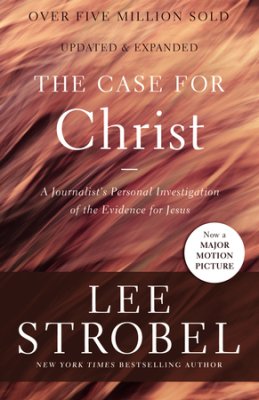Book/Movie Review: The Case For Christ
Read the full disclaimer here.

I once heard a statistic that of everyone who has put their faith in Christ, about 70% did so based on an emotional response, the other 30% through logic and reason. I would be in that 30%. As such, it should be no surprise that one of my favorite areas of Christian study is that of apologetics, or examining and discussing the facts and evidence pertaining to what is written in scripture. Over the years I have read several excellent apologetic authors, including Josh McDowell, Norman Geisler, and R.C. Sproul. My favorite author, by far, however, is Lee Strobel and his Case For... series of books.
Lee Strobel was a successful, famous investigative reporter for the Chicago Tribune who claimed no spiritual belief of any kind. To him, the only “faith” he had was in facts and hard evidence. In 1979, Lee’s wife Leslie announced to him that she had become a Christian. Lee was shocked and angered. First, he believed Leslie was an intelligent person who would not be susceptible to myths, fantasy, and wishful thinking. Second, he feared their lives would change drastically, and not for the better. Their fun, outgoing life was in danger of being replaced with struggles over prayer vigils and volunteering in soup kitchens. His wife’s decision prompted Strobel to investigate Christianity on his own, primarily to prove that it was all hogwash, but also because he saw pleasant, positive changes in his wife and was curious if there was anything substantial to her new faith that would cause them. Using the same tools he spent years refining as a reporter, Strobel embarked upon a two-year investigative journey that included book research and face-to-face interviews with experts in the fields of religion, archaeology, psychology, medicine, textual criticism and any others he thought might be relevant. In the end, instead of disproving Christianity, Strobel found the evidence supporting the life, crucifixion, and Resurrection of Jesus overwhelming, and to ignore it would mean turning his back on what he believed in all his life: Truth can only be determined by examining the facts. If the facts don’t support it, it’s not the truth.

Strobel’s investigation resulted in the book The Case For Christ, the first Strobel book that I had ever read. It briefly tells of Strobel's background and the reason for his investigation before going into the details of that investigation. The book includes interviews with experts interspersed with anecdotes of cases Strobel followed as a reporter. These anecdotes provided context for Strobel’s investigation by demonstrating parallel methods of investigation between his criminal cases and his spiritual case. I found the book to be an excellent resource and is one I readily suggest as a starting point to anyone who has a serious interest in Christianity (for reasons I’ll state below).
Sometime last year I saw a movie poster for the film adaptation of the book. I will admit I was skeptical and had concerns. I knew that the wealth of information included in the book would never fit in a single film. Furthermore, instead of the documentary I would expect, the poster gave the impression that the movie was more likely to be a dramatization of Strobel’s story. In the end, I feared that people with real questions might see a nice story sprinkled with some facts about Christ, but in the end wouldn’t be impacted the same as if they had read the book. Furthermore, those same people may never read the book themselves if they believed it was similar to the story presented on-screen instead of the investigative treatment it truly is.
The Movie
In recent weeks Deborah and I had a chance to see the Case For Christ movie and many of my concerns were realized. The movie was a dramatization of the events of Strobel’s investigation and the events leading up to it. From what I’ve read and heard the core of the story was pretty accurate, but with some characters and events changed or altered for dramatic, clarifying or other cinematic purposes. The movie followed three concurrent stories: Strobel’s relationship with his wife Leslie; Strobel’s investigation of the shooting of a police officer; and Strobel’s examination of scripture. As a movie, The Case For Christ was very well done. The quality was on par with most other independent movies that make it to the big screen. The story kept you interested and the acting was good. However, as I feared, the evangelistic impact of the film was minimal, at least when compared to the book.
Because of the time constraints of the film, the evidence for the Resurrection of Jesus was boiled down to about eight to ten bullet-points, one or two from each area of study. While the information was accurate, the way it was presented didn’t build an overwhelming case. For starters, little information was given about the experts Strobel interviewed. Apart from their profession (priest, archaeologist, medical doctor, etc.) not much was said about their education, experiences or qualifications concerning the Bible. They were pretty much anonymous professionals offering their personal opinions. Next, the interviews were condensed to two to four minutes conversations where a main point or two would be made, but little corroborating discussion to give the point much validity. For example, when examining how accurate today’s Bible is to what was written by the original authors, Strobel was told that because there are over 5,000 copies of biblical text available, some of them dating to within a century of the original writings, our Bible is an extremely accurate representation of the original documents. In fact, it is the most reliable ancient text in the world. Beyond that, nothing much else was said. There was not a lot of explanation as to how those things proved reliability or answers to any of the criticisms that question the Bible’s textual accuracy. In the end, a skeptical viewer might still have many questions or simply discount the information based on other arguments they have heard.
The Book
In contrast to the movie, the book is primarily a presentation of the information Strobel uncovered during his investigation of Christ and the Resurrection. As such, there is little narrative. In fact, the movie storylines about his relationship with his wife and newspaper investigation are presented completely within the introduction to the book. Each chapter deals with one area of study, or one particular segment of an area of study. Because of this, much more information is presented and the evidence is discussed in greater detail.
Each interview begins with an in-depth introduction of the expert being questioned. Strobel offers such information as their degrees, job history, publications, significant contributions, experience and qualifications regarding Biblical studies, and so on. In some instances, he relates a little of their life story and how it relates to their interest in scripture. By the time Strobel is done, the interviewee isn’t just an anonymous teacher with an opinion. He is a leading expert in his field who is more than qualified to study the data and present conclusions that are a result of many years examining and challenging that data.
Next, the evidence presented by each expert is discussed in great detail, including what the data is, how it relates to what is written the Bible, and why it is important. Strobel also presents several counter-arguments and criticisms, giving the expert opportunity to respond each argument’s validity within their understanding of the Biblical evidence. For instance, using our example above, the book goes into explaining what a textual copy is, why a large number of copies is significant, the origin of the copies, the authenticity of the copies themselves, and why the date of the copy is important. Furthermore, several arguments against textual accuracy are discussed, such as why the Bible was protected from corruption due to the “telephone game effect”.
Finally, Strobel includes in the book an extensive bibliography and reference list. Even with the extra time and space afforded in the book, the information given is only a small portion of what has been studied and what is available. At the end of each chapter, Strobel lists four to six additional references on the topic for further reading. When you add these to the additional materials that are cited within the chapter, the reader is offered nearly 100 additional sources to choose from if they wish to study the topic more in depth.
The Verdict
After comparing the two versions of The Case For Christ, I would recommend the movie to anyone who likes a good story, regardless of the subject matter. Also, Christians and others who are already familiar with Lee Strobel’s work will find the movie interesting, giving them a chance to learn more about him and the area of apologetics. Additionally, for someone showing an interest in the Christian faith, the movie might be a good starting point for learning more about the reliability of scripture and spark an interest in reading Strobel’s books.
However, for those more interested in a deeper discussion about the claims of the Bible, I would highly recommend the book. I believe Strobel does an excellent job of presenting the evidence in an easy-to-read, easy-to-understand format. Christians will be able to glean some useful tools from this book for discussing the claims of Jesus with skeptics, and while this book alone might not change a skeptic’s mind, it will offer some compelling evidence to think about, as well as a lifetime of additional study materials to read, if they are so inclined.